Building a birds nest
I bought my train ticket to Russia as soon as I arrived in Beijing and managed to get a bed in 2nd class on the 3 day train trip to Irkutsk. I had to wait 4 days before I could leave China so spent a bit of time wandering around the bird's nest building site.
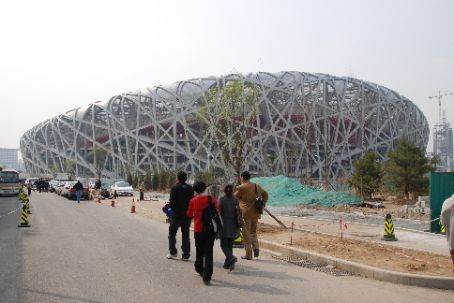
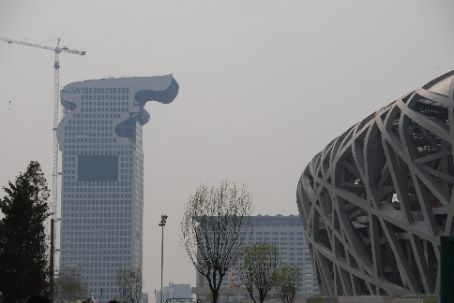
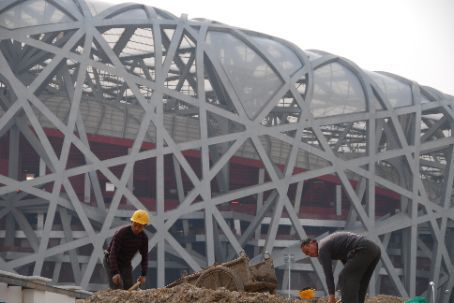
China is fantastic in that it is one of the few places in the world where a tourist can wander around a building site unhindered. I climbed through a hole in fence and spent a couple of hours with an American guy checking out how well the Olympics building madness was mapping out. With only three months to go, amazingly things were still a long way from being complete. I decided to lend a hand, I asked this group of very friendly gardeners if I could help out and they gladly took me on.
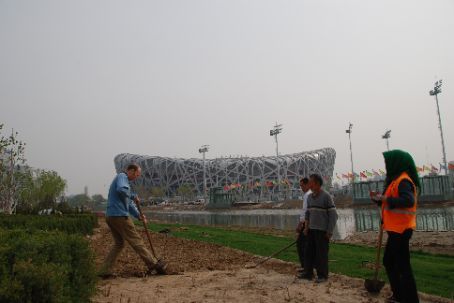
Leaving China for Russia
Apart from a brief trip to South Korea, I have been in China now since September last year. I spent the first 14 weeks learning the basics of Mandarin in Beijing with the Taipei Language Institute. They were recommended to me by a friend and they are absolutely fantastic.
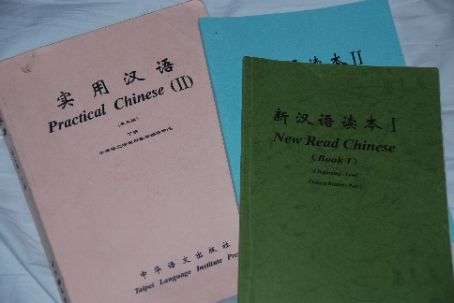
One on one lessons for as many hours a day as you like. By the end I was able to talk to people about buses, trains, hotels, weather, studying, get directions and enquire about what food is on the menu. If you do decide to take some lessons or even just listen to some podcasts Chinese people will complement your Mandarin skills. TLI makes you put an enormous amount of effort into getting your sounds right (if they are not right you will be talking gibberish or at best not saying what you mean). Being able to speak to locals made it much easier when in out-of-the-way places.
China is actually easy enough for non-Mandarin speakers. It just means that you have to be a little more patient, I met plenty of people who managed with a badly pronounced hello and goodbye. There is almost always someone ready and willing to help. In more remote areas you may have to use body language but essentially you can get by most of the time.
Food and accomodation
China is cheap if you know where to go. I met a guy from the USA on my return to Beijing who complained to me that restaurants are so expensive, but he wasn't looking in the right places. Check the side streets and search out the places where locals dine - not tourists or business people but locals. Food for 10 Yuan per meal is not that hard to find almost anywhere, cheaper looking restaurants' food is just as good and sometimes better than the posh places. The main problem with cheaper restaurants is that people smoke with a pashion. The best time to go is when they are not so busy.
Utels affiliated youth hostels are a smokers paradise - smoking is allowed everywere, including in dormitories. In both Utel places that I stayed in there was nowhere to go where the air was clear and fresh, eating, sleeping and drinking were all in smokey pub like rooms.
YHA China is a much better option for non-smokers. Goto www.yhachina.com and click on the English link. They also have higher standards for cleanliness and there are normally lots of English speaking Chinese people there. Ignore the guidebook and use www.yhachina.com to avoid the crowd.
Haggling
Haggling is like a game, the trader plays their card and you have to come back with something. They say something like "this is the best quality". Then you say "I think the shop in Guizhou has better quality". Then they say "but Shanghai is more expensive than Guizhou" and you reply with "I go to Guizhou next week, I will buy there". Always walk away because that is often when you get the best price - shouted at you once you get out of reach. Guizhou is a well known cheap province, use it in your haggling.
There are a few rules to remember:
1 Never believe what the traders say. They lie constantly and you should learn to do the same. Make anything up. I have often heard "cannot sell for less" or "I paid more for it" and then the price halves.
2 Never admit to being British, Chinese people believe British people are among the wealthiest of foreigners. Say you are Estonian or something more obscure - it means traders are less certain about how wealthy you might be. It affects the starting price.
3 Always check at several places, prices vary wildly.
4 Check items over thoroughly. Ask about prices before trying something on and never show any interest in the item.
5 You do not have to haggle. I hardly ever did and generally got what I wanted. I would say 25 is all I will pay. They say 100. I say 25, the trader follows with 65. Then I say "even 30 I will not pay, 25 or I don't want it anymore".
6 Often Chinese made items look great but are made with substitute materials, the rubber in shoes might not be thick enough, the cotton used to sew bags is not strong enough or glue is not very sticky. In my experience goods bought from a market do not last. For instance my second pair of shoes in 6 months has just fallen apart! Don't expect market goods to be good quality, haggle as though they are cheap rubbish. Paying 2 or 3 dollars for a pair of shoes and have them fall apart is not so bad. Paying $100 is embarrasing - yes I have heard people paying that much while wandering around the markets in Beijing. Haggle appropriately. Something else worth noting is that if you browse the posh department stores you will notice that the stores have lots of clothes made overseas sold there - Turkey, Bangladesh, India, Indonesia etc.
7 Postcards are often sold at tourists spots, they come in packs of 10. Prices range from 60 Yuan (almost AUS$10) per pack to 10 Yuan for 3 packs. Tell the seller that you bought 3 packs in Beijing for 10 Yuan. Alternatively, tell the seller that you only want 1 or 2 postcards, say you do not like the rest, it helps to bring the price down. It works.
8 Taxi drivers tell you all sorts of lies as well. I found Harbin to be the worst place but if you are armed with a map then their cries of "your hotel is too far/closed/not a good location/already full" can be easily rebuffed. Insist on using the meter (there are only a few rural areas where they really will not use it, everywhere else the drivers are bluffing you).